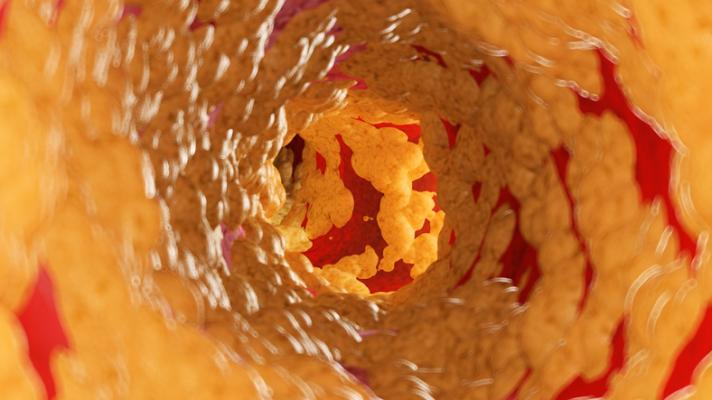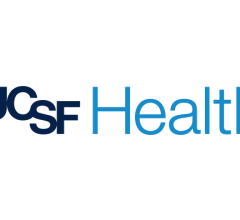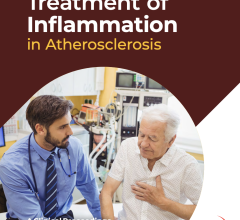
Results of the CLEAR Outcomes trial, presenting during the American College of Cardiology's Annual Scientific Session Together with the World Congress of Cardiology, ACC.23/WCC, were presented during the event's first late-breaking clinical trial session in New Orleans, LA. The study found Bempedoic Acid lowered cholesterol and reduced the risk of serious cardiovascular outcomes in statin-intolerant patients. Photo credit Getty Images.
March 4, 2023 — The cholesterol-lowering drug bempedoic acid was found to reduce the combined rate of major adverse cardiovascular events by 13%, meeting its primary endpoint in a large study of patients with high cholesterol who were unable to tolerate statins, according to research reported on during the American College of Cardiology’s Annual Scientific Session Together with the World Congress of Cardiology, ACC.23/WCC. The study was simultaneously published online in the New England Journal of Medicine.
The trial, called CLEAR Outcomes, is the first to assess whether bempedoic acid could reduce cardiovascular outcomes. It showed the drug was associated with significant reductions in the trial’s primary endpoint, a composite of cardiovascular death, heart attack, stroke or coronary revascularization (a procedure to open blocked arteries). As noted in an ACC news summary of findings, an analysis of different types of cardiac events found bempedoic acid led to a 23% reduction in heart attacks and a 19% reduction in coronary revascularizations, both of which were statistically significant. These benefits were seen in people who had previously experienced a cardiac event, as well as those who had not.
“We’re very pleased with the results,” said Steven E. Nissen, MD, chief academic officer of the Heart Vascular & Thoracic Institute at Cleveland Clinic and chair of the study. In presenting the findings during the first late-breaking session of ACC23/WCC, Nissen added, “People who couldn’t tolerate a statin did tolerate bempedoic acid and had a very good outcome. We are glad that we were able to demonstrate this level of efficacy on the outcomes that really matter to patients.”
The study enrolled over 14,000 statin-intolerant patients between December 2016 and August 2019 at over 1,200 sites in 32 countries. To participate, patients and their clinicians were required to acknowledge in writing their awareness of the benefits of statins and confirm the patient was unable to tolerate statin therapy. All participants had LDL levels of 100 mg/dL or higher at baseline and either a previous cardiac event or other risk factors for heart disease. On average, patients were 65 years old, nearly half were women (48%) and about 70% had experienced a previous cardiac event. Participants were randomly assigned to take 180 mg of bempedoic acid or a placebo daily and were followed for over three years, on average.
The combined rate of cardiovascular death, heart attack, stroke or coronary revascularization occurred in 11.7% of participants taking bempedoic acid and 13.3% of those taking a placebo. There was no significant difference in rates of death between the two study arms. Those receiving bempedoic acid saw their LDL cholesterol levels drop by about 20%-25% on average over the course of the study. Participants taking a placebo also saw a modest reduction in LDL cholesterol (up to 10% on average), which likely reflects closer monitoring and the addition of other cholesterollowering agents as part of their background therapy, according to researchers.
Participants taking bempedoic acid experienced higher rates of several adverse events than those taking a placebo, including renal impairment, gout and gallstones, as well as elevated hepatic enzymes, likely due to the drug’s activity in the liver. However, these side effects did not lead to a higher rate of drug discontinuation.
Researchers said that the 20%-25% reduction in LDL cholesterol reported for bempedoic acid is less of an impact than the 40%-50% reductions typically achieved with statins, a finding in line with previous studies indicating that bempedoic acid is not as effective at lowering cholesterol as statins or other therapies such as PCSK9 inhibitors. However, the study shows that this degree of change can still make a difference in the overall risk of cardiac events for patients who cannot tolerate statins, Nissen said.
“Statins are the cornerstone of risk reduction in patients with elevated LDL cholesterol,” he said. “Most people can take statins, but some cannot. This is the first study that directly addressed the problem of statin-intolerant patients. We achieved what we hoped we would get—a very positive result in a population of people who just could not tolerate statins.” The study was funded by Esperion Therapeutics, developer of bempedoic acid.
Elevated low-density lipoprotein (LDL) cholesterol in the blood can lead to blocked arteries and raise the risk of a heart attack, stroke and other forms of heart disease, noted the study’s authors. The ACC news summary on the study added that statins are the standard first-line treatment for lowering cholesterol and reducing the risk of heart disease. Bempedoic acid affects the same biological pathway that statins target but is not activated until it reaches the liver. This limits the drug’s effects on muscle, the brain and other tissues or organs and explains why it does not have the same side effects reported with statins. It is approved by the U.S. Food and Drug Administration as an additional treatment to help lower cholesterol in patients with certain conditions who have high cholesterol despite receiving maximally tolerated statin therapy.
Nissen and other presenters of the ACC.23/WCC late-breaking clinical trial session were introduced by Valentin Fuster, MD, PhD, Editor-in-Chief of the Journal of the American College of Cardiology (JACC) and President, Mount Sinai Heart, and Physician-in-Chief of The Mount Sinai Hospital (NY, NY). Fuster was introduced by ACC President Ed Fry, MD, Chair of the Ascension National Cardiovascular Service Line (Indianapolis, IN).
In responding to the presentation of findings, Fry commended Nissen and the team on the important study, emphasizing, “We can no longer ignore and not treat risk factors in patients who are at high risk for cardiovascular outcomes. And I think it is incumbent upon us as practitioners now to be engaged directly in terms of educating our patients to stay away from unproven therapies. We now have a proven therapy.”
More information: acc.org


 February 04, 2026
February 04, 2026 









